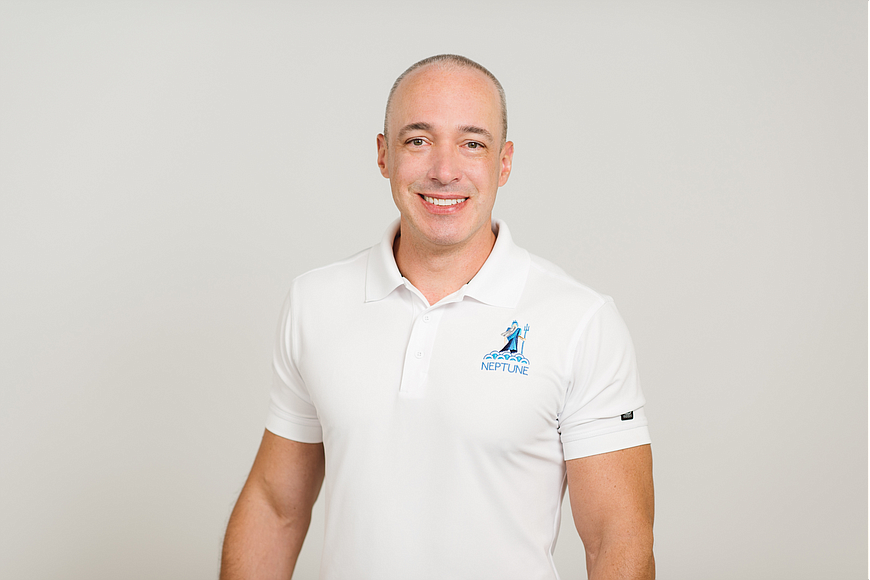- July 26, 2024
-
-
Loading

Loading

As the state and country tried to process the destruction of Hurricane Ian in the immediate aftermath of the storm’s trek across Florida, Trevor Burgess, CEO of Neptune Flood, was a popular interviewee. He made appearances on CBS News’ national morning newscast and WFLA, NBC’s local affiliate in Tampa, in addition to being quoted in the Wall Street Journal, among other publications.
Founded in 2018, Neptune Flood is an insurtech company specializing in a tech-driven approach to selling flood insurance policies. It does business in 48 states and Washington, D.C., and earlier this year surpassed 100,000 policies. Burgess expects that number to rise to 150,000 by the end of 2022.
Yet the number of flood insurance policies in Florida has dropped.
“Four years ago,” Burgess says, “about 17% of Floridians had flood insurance. Today, it’s 15%. We need everyone to look at their driver’s license, and if it says ‘Florida,’ they need to buy flood insurance. We can’t have a situation where only 15% of people in the most flood-prone state are insured.”
The federally backed National Flood Insurance Program, Burgess says, is increasingly an untenable option for many property owners. It has lost $37 billion throughout its history — “if they were a private company, they’d be bankrupt,” he says — and has been scaling back in Florida at a time when the state’s population is bursting with new residents. Companies like Neptune have an opportunity to step into the breach, but that’s easier said than done.
'We will see a surge of people buying flood insurance and getting insured and protecting themselves, and I hope that will be a lasting trend here, because when you add climate change to the mix, there’s an increasing risk of devastating outcomes with each passing year.’ Trevor Burgess, CEO of Neptune Flood
“We’re doing our part to help,” Burgess says, “but the NFIP is shrinking faster than Neptune can grow.” At present, his firm has written about 130,000 policies nationwide, but of those, only 30,000 are for customers in Florida. Hurricane Ian will boost that number, of course.
“Storms end up being that reminder, unfortunately,” Burgess says. “We will see a surge of people buying flood insurance and getting insured and protecting themselves, and I hope that will be a lasting trend here, because when you add climate change to the mix, there’s an increasing risk of devastating outcomes with each passing year. And just because you missed the storm this year doesn’t mean your chances are lower in the future.”
The artificial intelligence that underpins Neptune Flood’s system for determining coverage and rates will benefit immensely from the wealth of data collected from the aftermath of Hurricane Ian, Burgess says, though he wishes the storm had never come to Florida’s shores.
“We never wanted there to be a storm like this; the human cost has been absolutely terrible, and the rebuilding is going to take a long time,” he says. “But what’s different about Neptune is that we’re a technology company. We’ve built an AI engine that does a traditional job of the human underwriter to select which risks we’re going to underwrite, and then what price we’re going to charge. And that engine can get smarter over time. The data that we’ll get from this event is very useful in training our models to be more effective at charging the right price for the risk that we’re taking on. That’s the long-term vision — how do you create an insurance company that can properly underwrite flood insurance? Because the NFIP has not been able to do so.”
That’s just one piece of the puzzle, though. Despite its tight embrace of technology, Neptune Flood intends to lean more than ever on human insurance agents to educate customers.
“We’ve focused a lot on agent education,” Burgess says, “using insurance agents who trusted advisers to their clients to offer flood insurance every time they’re selling a homeowners insurance policy and not just when it’s required by law to purchase.”
One of the most significant long-term effects of Hurricane Ian, he adds, could be a total reassessment of what areas of the state require property owners to carry flood insurance. Could the entirety of Florida be considered a flood zone?
“If we look at where we’re seeing claims from this storm,” Burgess says, “Lee, Charlotte and Collier counties are ground zero, of course, but we have claims in Orlando and Jacksonville and up the coast. This is a widespread problem in the state of Florida.”